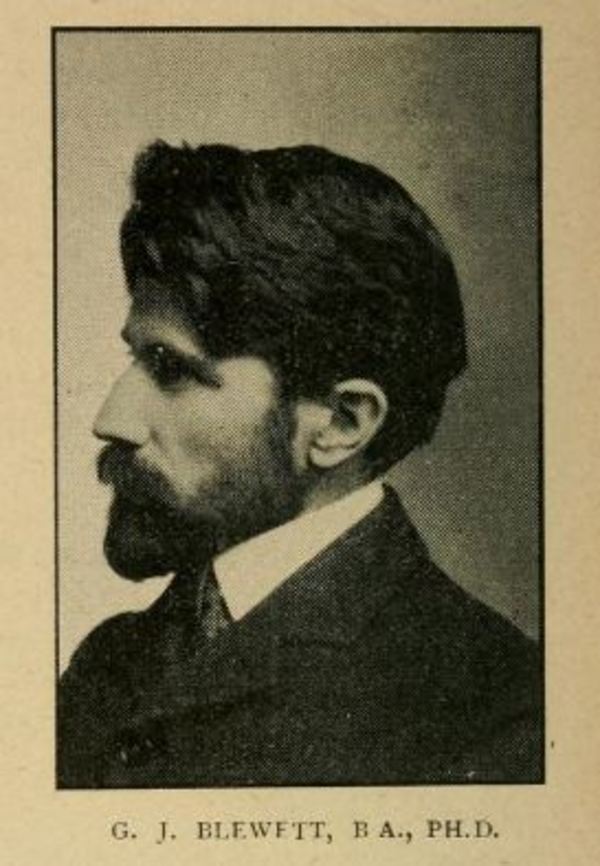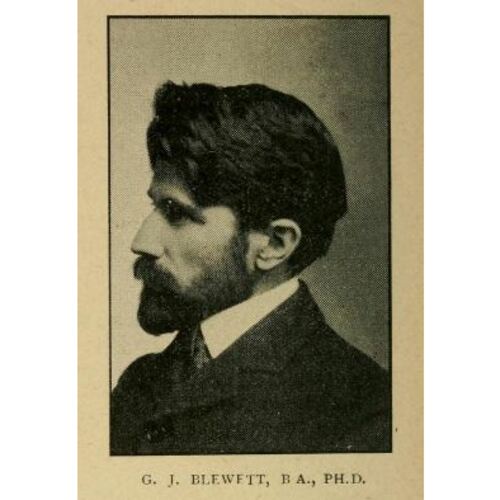
Source: Link
BLEWETT, GEORGE JOHN, university professor, philosopher, and author; b. 9 Dec. 1873 in Yarmouth Township, Ont., son of William Blewett, a farmer, and Mary Baker; m. 11 July 1906 Clara Marcia Woodsworth in Toronto, and they had two sons, one of whom died in infancy, and a daughter; d. 15 Aug. 1912 in Go Home Bay, Ont.
Raised on a farm near St Thomas, Ont., George Blewett attended the collegiate institute there. He was received on trial as a Methodist minister in 1894 and served briefly as a mission preacher in western Canada. A poor speaker but a brilliant student, he graduated from Victoria University in Toronto in 1897, winning several medals and prizes, and the following year was ordained. He studied at the University of Würzburg in Bavaria (Germany) in 1899, received a phd in philosophy in 1900 from Harvard University in Cambridge, Mass., and did further postgraduate work at Oxford and Cambridge in England.
In 1901 Blewett accepted a post as a lecturer in philosophy at Wesley College in Winnipeg [see Joseph Walter Sparling]. Five years later he returned to Ontario, where he married Clara Woodsworth (a fellow graduate of Victoria and a former lady principal of Alma Ladies’ College in St Thomas) and assumed the Ryerson professorship of moral philosophy at Victoria. He would receive repeated invitations to succeed renowned philosopher Borden Parker Bowne at Boston University, but the patriotic young academic chose to remain in Canada.
Blewett’s first book, The study of nature and the vision of God: with other essays in philosophy (Toronto, 1907), attracted international attention. Though he declined several offers to visit and lecture at American universities, he agreed to deliver the Nathaniel William Taylor lectures at the divinity school of Yale University in New Haven, Conn., during the winter of 1910–11. Published as The Christian view of the world (New Haven and Toronto, 1912), they brought the themes of his essays together, and quickly established the Methodist professor as one of Canada’s most distinguished philosophers.
Grounded in the theological liberalism of the 1890s, which insisted upon the presence of God in the world and the ethical and social meaning of Christianity [see George Monro Grant*], Blewett’s works explore both the relation between religion and reason and the concept of nature. Along with philosophers John Clark Murray and John Watson*, he supported the thesis that religion and reason were necessarily related. As the principle of order which organizes facts into a coherent whole, God is manifested in the world through knowledge developed by humans. God, Blewett concluded, is thus the totality of all relations that transform facts into bodies of knowledge. Because nature is the ground of all knowledge – the world in which humans act and discover – it is God’s route to the human mind. In turn, reason fuels the desire to make sense of one’s life, and in doing so directs one to revere the source of relations and coherence: God. Although Blewett wrote of God as the spiritual home of all possible orders, he did not really abandon the God of Christian faith – one who could intervene or forgive. Blewett was not entirely successful, however, at reconciling an active God with a God who makes conscious activity possible.
Breaking from traditional thinking, Blewett sought to remove any divisions between the spiritual and the material. “It is plain,” he argued in Christian view, “that any Idealism which is to be of constructive value to the theologian, must have some deeper insight into nature than simply that it is a system of ideas in our minds.” He therefore posited a progressive idealism that did not separate God, nature, and humankind into a conventional hierarchy, but integrated them in harmonious coexistence. It is very likely that Blewett’s broad view of nature, one that included earthly phenomena, was influenced by his rural upbringing and experiences in the west.
Blewett stepped easily from a fundamental respect for nature – God’s original ground – to practical and philosophical arguments for social transformation. He disparaged “the incredible profligacies of waste, and the social injustice, the oppression of class by class, which is the inevitable outcome of the spirit of unashamed and wasteful expense. In such a time, no one who wishes to see our practical life and its arts put upon just foundations can feel any vocation to encourage by so much as a syllable the laying aside of what fragment still remains to us of the bygone reverence of men toward their ancient mother, the dust of the ground.” Acclaimed for their ethical merit, Blewett’s statements of Christian duty in society, one historian has concluded, also “constituted perhaps the most philosophically sophisticated explication of the social gospel in Canada in his day.” One of this movement’s important early disciples, Methodist minister James Shaver Woodsworth*, Clara Blewett’s cousin, was almost certainly influenced by George Blewett’s teachings at Wesley and Victoria.
Blewett was not without critics. The ageing chancellor of Victoria, Nathanael Burwash, held that theologically he went too far, that religious belief could not be committed to purely philosophical reconstruction. Blewett’s work nevertheless anticipated new directions for Canadian Methodist thought and was strongly influential, but tragically his life was cut short at 38. In August 1912, at his Muskoka cottage, he drowned while he was swimming, evidently as a result of a heart attack. Survived by his pregnant wife and young son, Blewett was buried in the Necropolis in Toronto.
In addition to his two books, George John Blewett is the author of “The metaphysical basis of preceptive ethics” (phd thesis, Harvard Univ., Cambridge, Mass., 1900).
AO, RG 80-5-0-344, no.2603; RG 80-8-0-472, no.29365. Toronto Necropolis and Crematorium, Burial records and Blewett family monument, lot K-152. UCC-C, Fonds 3215. Victoria Univ. Library (Toronto), W. J. Rose, “A brief pilgrimage of George John Blewett, 1873–1912” (typescript, 1955). Globe, 17 Aug. 1912. Toronto Daily Star, 16 Aug. 1912. Leslie Armour and Elizabeth Trott, The faces of reason: an essay on philosophy and culture in English Canada, 1850–1950 (Waterloo, Ont., 1981). Canadian men and women of the time (Morgan; 1912). Ramsay Cook, The regenerators: social criticism in late Victorian English Canada (Toronto, 1985). A. B. McKillop, A disciplined intelligence: critical inquiry and Canadian thought in the Victorian era (Montreal, 1979). Allen Mills, Fool for Christ: the political thought of J. S. Woodsworth (Toronto and Buffalo, N.Y., 1991). Morton Paterson, “Divine encounter in Blewett,” Studies in Religion (Waterloo), 6 (1976–77): 397–403.
Cite This Article
Elizabeth Trott, “BLEWETT, GEORGE JOHN,” in Dictionary of Canadian Biography, vol. 14, University of Toronto/Université Laval, 2003–, accessed March 29, 2025, https://www.biographi.ca/en/bio/blewett_george_john_14E.html.
The citation above shows the format for footnotes and endnotes according to the Chicago manual of style (16th edition). Information to be used in other citation formats:
| Permalink: | https://www.biographi.ca/en/bio/blewett_george_john_14E.html |
| Author of Article: | Elizabeth Trott |
| Title of Article: | BLEWETT, GEORGE JOHN |
| Publication Name: | Dictionary of Canadian Biography, vol. 14 |
| Publisher: | University of Toronto/Université Laval |
| Year of revision: | 1998 |
| Access Date: | March 29, 2025 |



